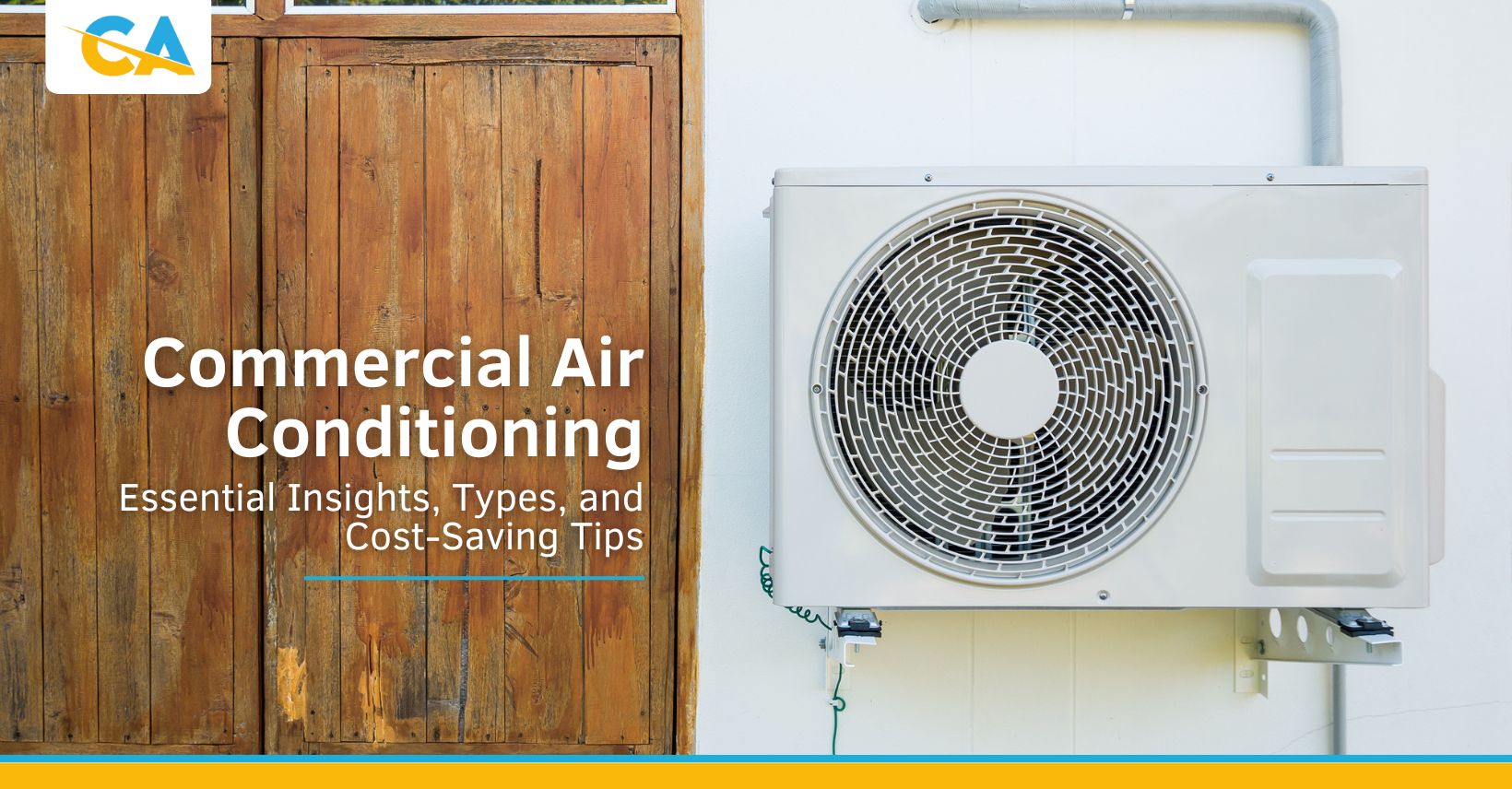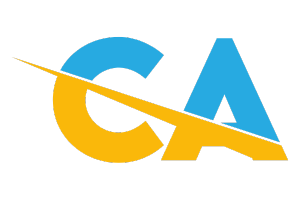A business owner must ensure a comfortable and productive environment for employees and customers.
Commercial air conditioning is not just about cooling your workspace. It’s about maintaining the ideal temperature and air quality that directly contribute to the comfort and productivity of your employees and the satisfaction of your customers.
In this comprehensive article, we will explore the importance of commercial air conditioning for businesses, the different types of systems available, factors to consider when choosing a system, tips for maintenance and extending the lifespan of your unit, common issues, and solutions, and how to save money on your cooling costs.
Stay tuned for expert insights on achieving commercial air conditioning success.
What Is Commercial Air Conditioning?
Commercial air conditioning involves HVAC systems designed for commercial spaces. These systems offer precise temperature control to maintain a comfortable environment for employees and customers.
These systems feature large-scale compressors, durable condenser units, extensive ductwork, and advanced control panels to meet the higher cooling demands of commercial properties. Unlike residential units, commercial systems often centralise cooling, efficiently serving multiple zones or floors.
Professional installation and regular maintenance are essential for optimal performance and energy efficiency. Experts design, install, and maintain these systems based on the specific needs of each commercial space, considering factors like size, layout, and occupancy.
This brings us to why commercial air conditioning is vital for businesses: It greatly impacts productivity and customer satisfaction.
Why Is Commercial Air Conditioning Important For Businesses?
Commercial air conditioning keeps businesses comfortable and controls temperatures, boosting employee productivity and customer satisfaction while managing energy use.
A well-regulated indoor environment creates a pleasant atmosphere for everyone inside. This leads to a better working environment for employees and a positive customer experience, encouraging longer stays and engagement with the business.
Efficient temperature control can reduce energy consumption and lower utility costs, leading to long-term savings. Choosing the right air conditioning system helps maximise these benefits.
What Are The Different Types Of Commercial Air Conditioning Systems?
Several commercial air conditioning systems are designed to meet the different needs of various businesses, each offering unique features and benefits customised to different commercial environments.
Packaged Systems
Packaged commercial air conditioning systems combine all the components of an HVAC system into a single unit, making them ideal for businesses with limited indoor space.
One key advantage of using packaged systems is the simplified installation process. Since all the components are pre-assembled into one unit, it greatly reduces the time and complexity of installation. Maintenance is also easier with packaged systems, as technicians only have to service one unit rather than multiple separate components, saving time and resources.
These systems are particularly effective in scenarios where space is limited, such as in urban office buildings or retail stores where rooftop space is at a premium. They are also ideal for new construction projects where fast and efficient installation is essential to meeting deadlines.
Split Systems
Split systems are a popular choice for commercial air conditioning. They consist of separate indoor and outdoor units that work together to provide efficient cooling and heating.
Split systems, a popular choice for commercial air conditioning, are renowned for their adaptability. They seamlessly fit into a variety of spaces, from offices and retail stores to restaurants and more, making them a versatile solution for any commercial setting.
This versatility caters to a wide range of commercial environments and instils confidence in their performance. These systems offer the advantage of energy efficiency, helping companies reduce energy bills and minimise their environmental impact. This feature aligns with the growing need for sustainable solutions.
One of the standout features of split systems is their unique advantage of customisation. This allows businesses to handpick the right size and type of units, customising the system to their specific needs.
This level of control over the system’s performance can be a game-changer, ensuring optimal operation and providing comfort to employees and customers alike.
Variable Refrigerant Flow Systems
Variable Refrigerant Flow (VRF) systems provide a flexible, energy-efficient commercial air conditioning solution, offering precise temperature control across multiple zones within a building.
VRF systems utilise a single outdoor condenser unit connected to multiple indoor units. They allow each indoor unit to operate independently, adjusting the refrigerant flow based on the specific cooling or heating needs of each zone.
This independent operation not only ensures optimal comfort for occupants but also leads to significant energy savings, a testament to the cost-effectiveness of VRF systems compared to traditional HVAC systems.
VRF systems are particularly beneficial for large commercial spaces with varied cooling and heating requirements. They improve efficiency and temperature consistency throughout the building. For businesses, making an informed choice about commercial air conditioning involves evaluating several important aspects.
What Factors Should Businesses Consider When Choosing A Commercial Air Conditioning System?
Selecting the correct commercial air conditioning system involves considering several vital factors to ensure that the chosen system meets the business’s specific needs and requirements.
Size and Capacity
The size and capacity of a commercial air conditioning system must be appropriately matched to the space it will serve to ensure effective cooling and heating without overburdening the system.
Proper sizing of HVAC systems is important, as an undersized unit will need help maintaining ideal temperatures, resulting in uncomfortable working conditions and reduced energy efficiency. On the other hand, an oversized unit may cool too quickly, leading to frequent on-off cycles that can prematurely wear out components and escalate energy costs. Calculating the exact cooling and heating load of the commercial space is essential for selecting the right system size, factoring in factors like building size, insulation, occupancy levels, and more.
Energy Efficiency
Energy efficiency is a critical consideration for commercial air conditioning systems as it directly impacts operational costs and the business’s environmental footprint.
One key benefit of energy-efficient HVAC systems is the potential for considerable cost savings on energy bills. By using systems designed to operate more efficiently, businesses can lower their monthly expenses and improve their bottom line. Energy-efficient systems also contribute to a reduced environmental impact by consuming less electricity and minimising greenhouse gas emissions.
When evaluating different HVAC options, businesses should look for systems with high Seasonal Energy Efficiency Ratio (SEER) ratings, Energy Star certification, and advanced features like variable-speed motors and programmable thermostats.
Maintenance and Service
Regular maintenance and professional service are essential for commercial air conditioning systems’ longevity and efficiency, helping prevent costly repairs and downtime.
By scheduling routine maintenance checks, business owners can ensure that their HVAC systems are operating at peak performance, reducing energy consumption and extending the lifespan of the equipment. Engaging the services of experienced HVAC contractors can provide expertise in identifying and fixing potential issues before they escalate into major problems, ultimately saving both time and money.
Developing a maintenance schedule that includes changing filters, cleaning coils, and inspecting ducts can greatly improve system performance and indoor air quality. This proactive approach enhances comfort for employees and customers and maintains a healthy environment conducive to productivity.
Cost
While the initial cost of a commercial air conditioning system can be substantial, the long-term savings and return on investment from an efficient, well-maintained system are important.
Installation costs vary based on the system’s complexity and size, including ductwork and labour fees. Regular maintenance, such as filter replacements and tune-ups, maximises efficiency and extends lifespan. Operational costs, including electricity usage and repairs, affect expenses over time. Balancing these factors ensures a cost-effective system.
Investing in energy-efficient technology leads to savings on utility bills, offsetting higher upfront costs. This careful balance protects your investment and sets the stage for effective strategies to maintain and extend the lifespan of commercial air conditioning systems.
How Can Businesses Maintain And Extend The Lifespan Of Their Commercial Air Conditioning Systems?
To maintain and extend the lifespan of commercial air conditioning systems, businesses must implement regular maintenance practices and address any issues promptly to ensure optimal performance and efficiency.
Regular Maintenance and Inspections
Regular maintenance and inspections are required to keep commercial air conditioning systems running efficiently and reduce the risk of unexpected breakdowns and costly repairs.
During regular maintenance checks, the HVAC system’s filters, coils, fins, and refrigerant levels should be inspected. Clean filters ensure optimal airflow, while dirty coils and fins can reduce efficiency.
Low refrigerant levels can decrease cooling performance. Checking for leaks, loose electrical connections, or unusual noises can help identify issues early on.
Proper maintenance enhances the system’s performance and extends its lifespan, saving energy costs and preventing major malfunctions. Consistent upkeep is key to preventing HVAC system failures.
Cleaning and Replacing Filters
Cleaning and replacing filters in commercial air conditioning systems is a simple yet vital maintenance task that ensures optimal airflow and air quality.
Regular maintenance includes checking filters every 1-3 months, with higher frequency in dusty environments. Replacing filters is usually recommended every 3-6 months, but this can vary based on usage and filter type.
Dirty filters restrict airflow, causing the system to work harder and consume more energy, ultimately impacting efficiency and increasing operating costs. Clogged filters lead to poor indoor air quality, potentially aggravating allergies and respiratory issues among occupants.
Addressing Repairs Promptly
Timely repairs prevent minor issues in commercial air conditioning systems from becoming major, costly problems. Professional contractors quickly identify and fix these issues, keeping AC units running smoothly.
Their expertise ensures the root cause is efficiently addressed, reducing the likelihood of recurring breakdowns. These experts create proactive maintenance schedules to extend the system’s lifespan and boost performance.
Regular inspections and tune-ups prevent unexpected failures and improve energy efficiency, leading to substantial cost savings over time. This approach is key to handling the common challenges commercial air conditioning systems face.
What Are Some Common Issues And Solutions For Commercial Air Conditioning Systems?
Commercial air conditioning systems can encounter various common issues, but understanding these problems and their solutions can assist businesses in sustaining optimal performance and preventing expensive disruptions.
Poor Airflow
Poor airflow in commercial air conditioning systems can result from clogged filters, blocked ducts, or issues with the blower motor, leading to inefficient cooling and heating.
When filters get clogged with dirt and debris, airflow is restricted, causing strain on the system and reducing efficiency. Blocked ducts can impede air movement, resulting in uneven temperatures throughout the building. Problems with the blower motor, such as worn-out belts or motor issues, can also hinder proper air circulation. Diagnosing poor airflow involves checking filters regularly, inspecting ductwork for obstructions, and testing the blower motor’s functionality.
Cleaning or replacing filters is essential to restore proper airflow. Ensuring ducts are free from blockages and obstructions can greatly improve air distribution.
Addressing blower motor malfunctions promptly by repairing or replacing components can help maintain system efficiency. Regular maintenance, including professional inspections and tune-ups, is important for preventing airflow issues and maximising the air conditioning system’s lifespan.
Leaks and Refrigerant Issues
Leaks and refrigerant issues in commercial air conditioning systems can cause considerable problems, including reduced cooling capacity and increased energy consumption.
One of the most evident signs of refrigerant leaks is a noticeable decrease in the system’s cooling efficiency. If you observe that your AC is taking longer to cool the space or is not reaching the desired temperature despite running continuously, it could indicate a potential refrigerant leak. Strange noises indicate a leak, such as hissing or bubbling sounds from the unit or visible frost or ice buildup on the refrigerant lines.
Addressing refrigerant leaks promptly is essential to preventing further damage to the system and maintaining an optimal indoor climate. Neglecting these issues can lead to more severe damage, eventually resulting in costly repairs or even the need for a full system replacement.
When dealing with refrigerant leaks, the first step is to locate the source of the leak. This involves thoroughly inspecting the refrigerant lines, coils, and connections. Once the leak is identified, the damaged components must be repaired or replaced. After the repairs, the system must be recharged with the correct amount of refrigerant to ensure optimal performance.
Electrical Problems
Electrical problems in commercial air conditioning systems can range from faulty wiring to issues with the thermostat or control board, impacting the system’s overall performance.
These issues can often lead to disruption in cooling efficiency, uneven temperatures, and, in some cases, complete system failure. Identifying these problems early on is important to prevent further damage and ensure the system operates safely. Common signs to watch out for include flickering lights, circuit breakers frequently tripping, or unusual noises from the unit.
While minor issues like tripped breakers can be resolved by resetting them, more complex problems such as wiring faults or malfunctioning components require the expertise of professional contractors in the field. Contractors play a vital role in diagnosing, repairing, and maintaining commercial air conditioning systems, ensuring optimal performance and safety.
Thermostat Malfunction
A malfunctioning thermostat affects temperature control in commercial air conditioning, impacting comfort and efficiency. Signs include inconsistent temperatures, frequent cycling, unresponsive controls, or inaccurate readings.
Causes range from dust accumulation to wiring issues or ageing components. Regular maintenance and prompt repairs are necessary. Upgrading to a modern programmable thermostat improves temperature control, saves energy, and allows remote access for adjustments.
These smart thermostats provide data insights to optimise energy use and comfort. Consider how businesses can cut costs and boost efficiency by saving on commercial air conditioning expenses.
How Can Businesses Save Money On Their Commercial Air Conditioning Costs?
Businesses can save money on commercial air conditioning costs by investing in energy-efficient systems, implementing proper maintenance practices, and utilising smart thermostats and automation technologies.
Investing in Energy-Efficient Systems
Investing in energy-efficient commercial air conditioning systems can greatly reduce operational costs and contribute to long-term savings for businesses.
One key benefit of opting for energy-efficient systems is the notable reduction in energy consumption, leading to a more sustainable and environmentally friendly operation.
This not only helps lower utility bills but also lessens the business’s overall carbon footprint. Selecting HVAC units with high energy efficiency ratings ensures that businesses make a smart investment that will pay off in the long run.
Implementing Proper Maintenance Practices
Implementing proper maintenance practices is essential for ensuring the efficiency and longevity of commercial air conditioning systems, ultimately leading to cost savings.
Regular inspections identify potential issues before escalating, allowing timely interventions to prevent expensive breakdowns. Keeping the system clean by changing filters and clearing ducts ensures optimal airflow. It reduces strain on the equipment, resulting in improved efficiency and lower energy costs.
Prompt repairs address minor problems before they become major faults, minimising downtime and avoiding costly emergency service calls. By following these maintenance practices conscientiously, businesses can extend the lifespan of their HVAC systems and maximise their return on investment in the long run.
Utilising Smart Thermostats and Automation
Utilising smart thermostats and automation in commercial air conditioning systems enhances energy savings by providing precise temperature control and reducing wastage.
Smart thermostats offer features that boost efficiency and cost-effectiveness. Remote control capabilities allow users to adjust settings from anywhere, ensuring optimal comfort without wasting energy. Programmable schedules customise settings based on occupancy, further optimising energy use.
Real-time energy usage monitoring offers insights into consumption patterns, enabling informed decisions for additional savings. These features result in significant cost savings and reduced environmental impact, making smart thermostats a valuable investment for businesses aiming for sustainability. To wrap up, we’ll uncover key insights for achieving success in commercial air conditioning.
Essential Insights for Commercial Air Conditioning Success
As businesses strive for operational efficiency and a comfortable environment, understanding the essential insights for commercial air conditioning success can greatly impact achieving these goals.
Selecting the right commercial air conditioning system is required to meet the specific needs of the business space. By investing in a system that is appropriate in size and capacity, businesses can ensure optimal performance and energy efficiency.
Regular maintenance is key to extending the air conditioning system’s lifespan and preventing costly breakdowns. Scheduled inspections and tune-ups help identify potential issues early on, ensuring smooth operation and minimising disruption to daily activities.
Energy efficiency should be a top priority as it reduces operational costs and minimises environmental impact. Employing energy-saving strategies such as programmable thermostats, proper insulation, and regular filter replacements can lead to substantial cost savings in the long run.
Looking for professional guidance from HVAC experts can provide businesses with customised solutions and recommendations for enhancing the efficiency and performance of their commercial air conditioning systems. With the right expertise and support, businesses can create a comfortable indoor environment while optimising energy usage and reducing expenses.





